Datomic
Datomic is a distributed database designed to enable scalable, flexible and intelligent applications. It uses Datalog and transaction processing to provide ACID transactions, temporal database capabilities and flexible data modeling. Datomic is well suited for applications that n
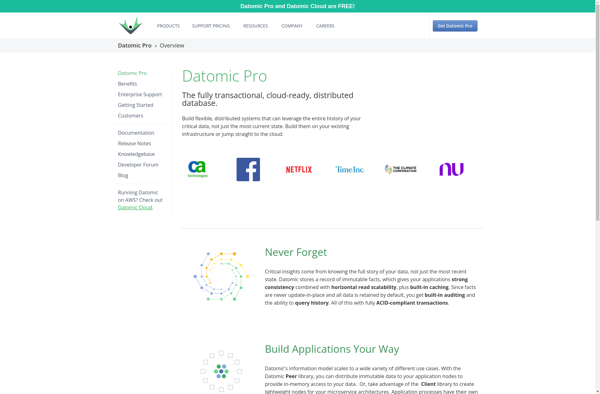
Datomic: Distributed Database for Scalable Applications
Distributed database designed for scalable, flexible and intelligent applications with ACID transactions, temporal database capabilities and flexible data modeling, well suited for large data sets across multiple servers.
What is Datomic?
Datomic is a distributed database designed from the ground up to enable scalable, flexible and intelligent applications. Some key capabilities and features of Datomic include:
- Distributed architecture - Datomic can run across multiple servers/devices to scale up and handle large data volumes.
- Immutable data model - Datomic treats all data as immutable and accumulates facts over time. This facilitates auditing, historical querying and increases flexibility.
- Datalog support - Datomic allows expressing flexible queries and rules using Datalog, a declarative logic programming language.
- Temporal capabilities - Datomic natively supportsTemporal (time based) queries on data.
- Flexible schemas - Datomic has flexible schemas that allow diverse data shapes within the same database.
- ACID transactions - Datomic provides atomic, consistent, isolated and durable transactions to ensure data integrity.
- Programmatic database interaction through an HTTP API and application integration libraries.
Some typical applications that benefit from Datomic's capabilities include IoT data pipelines, event sourcing systems, audit/compliance logging systems and AI/ML applications that need immutable historical data.
Datomic Features
Features
- Distributed database
- Uses Datalog query language
- ACID transactions
- Temporal/historical database capabilities
- Flexible schema design
- Scalable across multiple servers
Pricing
- Subscription-Based
- Pay-As-You-Go
Pros
Handles large datasets and scales horizontally
Flexible schema allows for evolving data models
Query performance optimized for reads
Built-in caching improves read speeds
ACID transactions ensure data consistency
Temporal querying enables data auditing
Cons
Not ideal for OLTP workloads
Limited ad-hoc querying capabilities
Proprietary query language has learning curve
Hosted cloud option only available on AWS
Official Links
Reviews & Ratings
Login to ReviewThe Best Datomic Alternatives
Top Development and Databases and other similar apps like Datomic
Here are some alternatives to Datomic:
Suggest an alternative ❐MongoDB
MongoDB is an open-source, document database designed for ease of development and scaling. Some key advantages of MongoDB include:Document Model: MongoDB stores data in flexible, JSON-like documents rather than rows and columns used in traditional RDBMS. This allows for dynamic schemas and easy data manipulation.Scaling: MongoDB is highly scalable and...
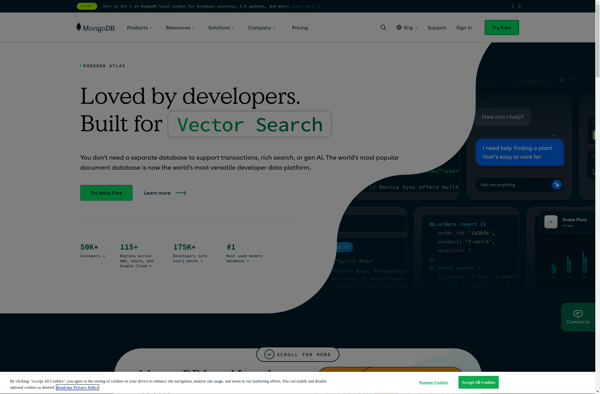
Apache Cassandra
Apache Cassandra is a free, open-source, distributed NoSQL database management system designed to handle large amounts of data across many commodity servers, providing high availability with no single point of failure.Key features of Cassandra include:Decentralized architecture with no single point of failureLinear scalability and proven fault-tolerance on commodity hardwareFlexible data...
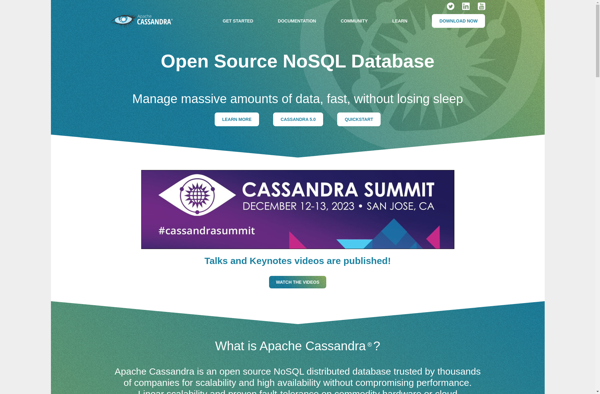
CockroachDB
CockroachDB is an open-source, distributed SQL database that provides scalability, survivability, and data consistency across multiple datacenters. Some key features include:Distributed architecture that scales horizontallyAutomated replication and failover for high availabilitySupport for strongly consistent ACID transactionsGeographic distribution of data across multiple datacentersAutomatic rebalancing and repair after failuresSQL interface with support...
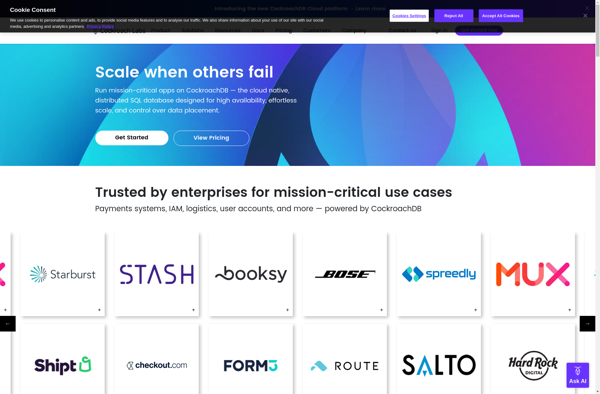
Microsoft SQL Server
Microsoft SQL Server is a relational database management system (RDBMS) developed by Microsoft. It is used for storing, retrieving, managing and analyzing data. SQL Server supports both online transaction processing (OLTP) and data warehousing workloads. Key features include:Support for structured, semi-structured and unstructured dataIn-Memory OLTP for faster transaction processingColumnstore indexes...
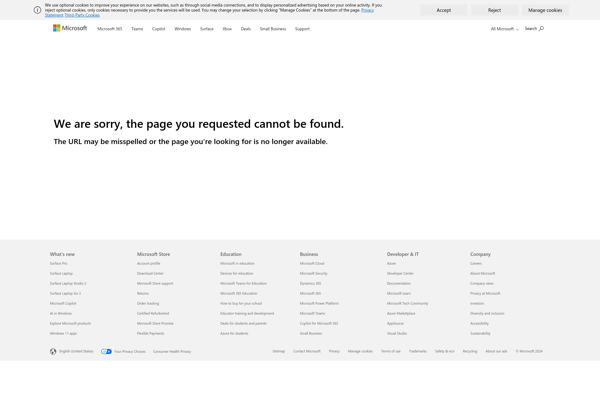
Oracle Database
Oracle Database is a powerful, enterprise-level database management system developed and supported by Oracle Corporation. It is used by organizations across industries to store, organize, and process large amounts of data efficiently and securely.Some key features of Oracle Database include:Support for both relational and non-relational database structures like JSON, XML,...
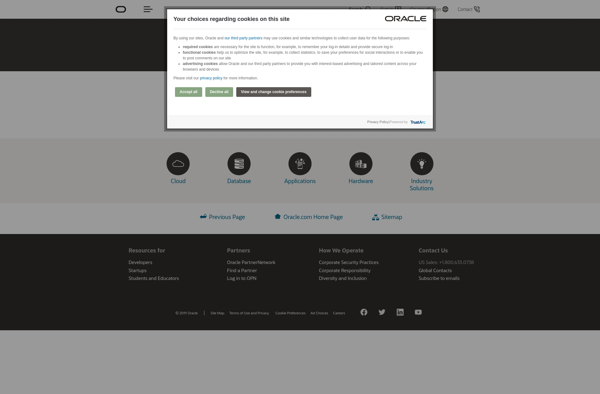
H2 Database Engine
The H2 Database Engine is an open-source relational database management system written in Java. It can be embedded in Java applications or run in client-server mode, with either TCP or disk-based database files.Some key features of H2 include:Small footprint - The H2 jar file is around 2MB and it has...

Titan Database
Titan is an open-source, distributed graph database designed to handle large-scale graph data sets efficiently. It utilizes a NoSQL architecture and provides linear scalability, as well as real-time data access through a transactional database.Some key features of Titan Database include:Support for graph structures containing hundreds of billions of vertices and...
RethinkDB
RethinkDB is an open-source, distributed JSON document database designed for easy scalability and high availability. Some key features of RethinkDB include:JSON document storage with a flexible schemaIntuitive ReQL query languageChangefeeds for easy scale-out and replicationAutomatic sharding and failover handlingSimple administration with a clean CLI and web UIStrong consistency guaranteesPowerful indexing...

Azure Cosmos DB
Azure Cosmos DB is a globally distributed, multi-model database service designed to enable you to elastically and independently scale throughput and storage across any number of Azure regions worldwide. It offers throughput, latency, availability, and consistency guarantees with comprehensive service level agreements (SLAs), something no other database service offers.Key capabilities...

OrbitDB
OrbitDB is a decentralized peer-to-peer database built on top of IPFS, the InterPlanetary File System. It provides an easy-to-use API for storing and managing data in decentralized networks and applications.Some key features of OrbitDB include:Peer-to-peer - Data is replicated directly between peers rather than relying on central serversDistributed and decentralized...
